Sunday, November 29, 2009
Friday, November 27, 2009
POM wonderful
After a tasty, tasty dinner of roast turkey and cranberry sauce, stuffing, three cheese potatoes au gratin, and roast green beans, followed by a dessert of maple-walnut pie and blueberry cobbler with an oatmeal raisin cookie crust, we opened up a pomegranate. Definitely the highlight of the meal for the two kids. Here's Sylvia covered in juice:


And here's the tasty maple-walnut pie we made:

(next time I'll stick with the Kentucky pecan, though!)


And here's the tasty maple-walnut pie we made:

(next time I'll stick with the Kentucky pecan, though!)
Wednesday, November 25, 2009
black or white
Today is the 150th anniversary of the publication of "The Origin of the Species"--a book that changed the world, changed our understanding of our place. And I've never actually read it. I should, but it's one of those books I've just never gotten around to reading. I've buckets of other evolutionary research, but have never taken the time to read more than a few excerpts of the books upon which that other research is based. (That may sound bad, but it's really surprisingly common--it's usually faster and easier to learn the conclusions of basic research from textbooks and reviews than it is to go read all the basic literature yourself.)
Over at BCC, there are a series of posts on the relationship between evolution and faith, particularly Mormonism. In this post, SteveP argues the God of the gaps embraced by ID (and by too many Mormons who want to embrace ID) is not just bad science, it's bad theology.
I have to agree. If you assume God is in the gaps, science truly is constantly pushing God into a smaller and smaller space. Which it's not.
I don't know what God is, other than my creator, but I do believe s/he/it exits. My religion says God is a man who was once as we are, who created us, who had a literal son who died and in so doing atoned for my sins. That teaching, as many others, resonates in my being in a way that makes me believe it is true. But it could be wrong. The teachings of the temple resonate in a way that makes be believe them. But it too, could be wrong. Other stuff I think could as easily be made up as true. Even the stuff I believe I acknowledge could be made up or wishful thinking (though that's as much the doubt of a scientist speaking as anything else).
Even with that uncertainty, I'm okay having faith, understanding what I believe may be very different from the truth. I don't think that uncertainty means there is no God, only that we humans have an incredibly incomplete understanding of God, and since we don't like uncertainty, we've filled in the gaps in our understanding with stories that sound good--at least until some evidence comes along that contradicts the story, forcing a re-examination of beliefs. I would rather hold to the stories, acknowledging their potential weakness, than hold to an either-or philosophy that claims either we have it all right (which is highly doubtful) or it's all wrong (which is unsatisfactory).
Over at BCC, there are a series of posts on the relationship between evolution and faith, particularly Mormonism. In this post, SteveP argues the God of the gaps embraced by ID (and by too many Mormons who want to embrace ID) is not just bad science, it's bad theology.
I have to agree. If you assume God is in the gaps, science truly is constantly pushing God into a smaller and smaller space. Which it's not.
I don't know what God is, other than my creator, but I do believe s/he/it exits. My religion says God is a man who was once as we are, who created us, who had a literal son who died and in so doing atoned for my sins. That teaching, as many others, resonates in my being in a way that makes me believe it is true. But it could be wrong. The teachings of the temple resonate in a way that makes be believe them. But it too, could be wrong. Other stuff I think could as easily be made up as true. Even the stuff I believe I acknowledge could be made up or wishful thinking (though that's as much the doubt of a scientist speaking as anything else).
Even with that uncertainty, I'm okay having faith, understanding what I believe may be very different from the truth. I don't think that uncertainty means there is no God, only that we humans have an incredibly incomplete understanding of God, and since we don't like uncertainty, we've filled in the gaps in our understanding with stories that sound good--at least until some evidence comes along that contradicts the story, forcing a re-examination of beliefs. I would rather hold to the stories, acknowledging their potential weakness, than hold to an either-or philosophy that claims either we have it all right (which is highly doubtful) or it's all wrong (which is unsatisfactory).
Tuesday, November 24, 2009
Uncle Philip's wedding
In spite of Sylvia getting sick Friday and loosing her lunch on the way to the rehearsal, and then me coming down with whatever she had on Saturday (though sans puking), I think we all managed to have fun at Philip and Kelly's wedding. I didn't take nearly enough pictures, especially before the wedding itself. I'll let the ones I did take speak for themselves.

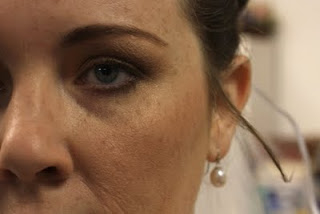

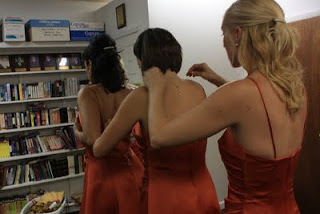

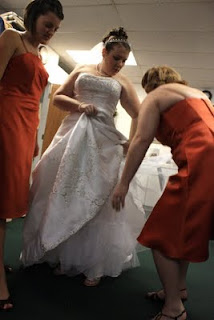



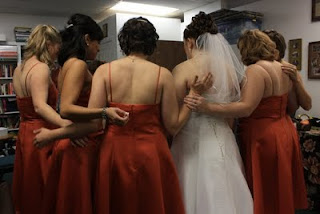


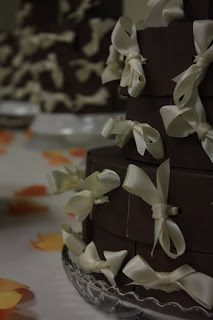

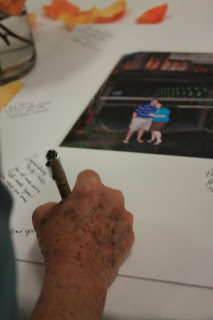


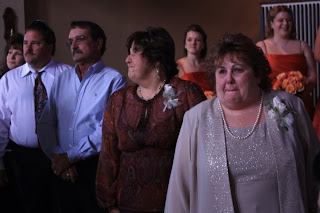
































Thursday, November 19, 2009
Fairness
CEO's make a lot of money. Really, it's understandable--the top dog should get paid the highest wage. Top management decisions are very important to the proper functioning of a company and I'm sure the job of a CEO is very time consuming and high pressure.
But is it really fair that a CEO makes more than 100 times the salary of the lowest paid employee? Are they really working THAT much harder; are they really worth THAT much more?
Free market economists would probably say sure. The free market (as free as it is) values them that highly, so that must be what they're worth.
This paper argues differently. Using thermodynamics as a base and equating fairness with entropy, it estimates a CEO is worth about 8 to 16 times what the least valuable employee is, and so should be paid accordingly.
It's nice to know the outrage so many have expressed at the magnitude of CEO pay packages is based on sound principles of fairness. It's also really cool fairness in an economic system can be expressed mathematically.
But is it really fair that a CEO makes more than 100 times the salary of the lowest paid employee? Are they really working THAT much harder; are they really worth THAT much more?
Free market economists would probably say sure. The free market (as free as it is) values them that highly, so that must be what they're worth.
This paper argues differently. Using thermodynamics as a base and equating fairness with entropy, it estimates a CEO is worth about 8 to 16 times what the least valuable employee is, and so should be paid accordingly.
It's nice to know the outrage so many have expressed at the magnitude of CEO pay packages is based on sound principles of fairness. It's also really cool fairness in an economic system can be expressed mathematically.
Monday, November 16, 2009
Evils of the dole
There are some weeks when I am incredibly grateful to not have to teach Sunday school. Not that there's really any probability of me ever teaching in church--my one RS lesson was a bit of a mess. Anyway, this week I'm rather glad I didn't have to find a way to teach the SS lesson. Welfare is a thorny subject to begin with and trying to figure out how to teach a lesson when most of the quotes talk about the "evils of the dole" would be more of a challenge than I'd want to tackle, especially in a ward full of people utilizing government programs to make their and their children's lives better.
Here's the problem: I don't think welfare, or going on welfare, is evil. I don't think it's a bad decision for most people who make it. I don't think those who go on welfare for a period of time are in any way taking from the rest of us. Most people who utilize government assistance are women with children, typically divorced or widowed (though most often divorced). Most women who go onto welfare are off within 4 years, many far earlier. Basically, welfare acts as a bridge during a period of financial distress, allowing recipients to enjoy a reasonable standard of living while they retrain, find a new/better paying job, or get remarried. Because the main benefit of welfare goes to women and to the children they care for, the anti-welfare rhetoric, both from the church and from the republican party, feels very anti-woman and very anti-family to me.
I realize most of the quotes for the lesson came from the depression, but again, I find it terribly anti-family to speak so ill of programs that literally kept families from starving to death. It's one thing to tell people to stay off the dole in a farming community, where there is a possibility of a community coming together to keep people fed and sheltered at least during times of financial stress; it's quite another when your communities are urban and the best, most efficient way of taking care of people is to pay for it.
I think the "evils of the dole" rhetoric stems from a lack of trust and respect for those utilizing those resources. An idea that if you are utilizing welfare it's because you're lazy and if you just worked harder at a worthy job you wouldn't need to be on the dole. It's a belief that "I'll never need this" and a lack of recognition that those who do need welfare could be those close to us (or even us, given the wrong circumstances).
I for one am glad welfare exists and blesses the lives of those who are in need of it. I'm happy that small percentage of the tax money I pay to my government goes to keeping people from falling into destitution. As I'm sure I've said before, I'm glad my country takes care of its less fortunate citizens, recognizing those who are less fortunate today may very well become the leaders and innovators of tomorrow, if they just have a chance.
Here's the problem: I don't think welfare, or going on welfare, is evil. I don't think it's a bad decision for most people who make it. I don't think those who go on welfare for a period of time are in any way taking from the rest of us. Most people who utilize government assistance are women with children, typically divorced or widowed (though most often divorced). Most women who go onto welfare are off within 4 years, many far earlier. Basically, welfare acts as a bridge during a period of financial distress, allowing recipients to enjoy a reasonable standard of living while they retrain, find a new/better paying job, or get remarried. Because the main benefit of welfare goes to women and to the children they care for, the anti-welfare rhetoric, both from the church and from the republican party, feels very anti-woman and very anti-family to me.
I realize most of the quotes for the lesson came from the depression, but again, I find it terribly anti-family to speak so ill of programs that literally kept families from starving to death. It's one thing to tell people to stay off the dole in a farming community, where there is a possibility of a community coming together to keep people fed and sheltered at least during times of financial stress; it's quite another when your communities are urban and the best, most efficient way of taking care of people is to pay for it.
I think the "evils of the dole" rhetoric stems from a lack of trust and respect for those utilizing those resources. An idea that if you are utilizing welfare it's because you're lazy and if you just worked harder at a worthy job you wouldn't need to be on the dole. It's a belief that "I'll never need this" and a lack of recognition that those who do need welfare could be those close to us (or even us, given the wrong circumstances).
I for one am glad welfare exists and blesses the lives of those who are in need of it. I'm happy that small percentage of the tax money I pay to my government goes to keeping people from falling into destitution. As I'm sure I've said before, I'm glad my country takes care of its less fortunate citizens, recognizing those who are less fortunate today may very well become the leaders and innovators of tomorrow, if they just have a chance.
Thursday, November 12, 2009
Mass wasting
Inspired by a story I heard on Radiowest about the Extreme Ice Survey, I baked this cake:

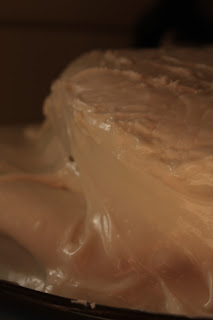


I call it the mass-wasting cake. It's very tasty--pumpkin spice cake sliding around on cream-cheese frosting. I keep thinking there's got to be a lab in here somewhere--something about viscosities and angles of repose. Mmm, yummy science.




I call it the mass-wasting cake. It's very tasty--pumpkin spice cake sliding around on cream-cheese frosting. I keep thinking there's got to be a lab in here somewhere--something about viscosities and angles of repose. Mmm, yummy science.
Wednesday, November 11, 2009
Belief
I've talked about belief before, mostly in a religious/political sense. Scientific belief is quite a bit different in that science isn't so much a "belief" as "I agree X is the best explanation for Y because the weight of data/scientific evidence convinces me it is true." I shorten this to belief for the sake of brevity, but it's really quite different than testimony, which is what I talk about when I reference religious belief, or social/economic/governmental conviction, which is (at least closer to) what I'm talking about with regard to political belief.
Why do I bring this up? Because in a scientific way I believe in global warming and wish there were a better way to express that than to say I believe in it. I am convinced global warming is happening because numerous proxies, including borehole temperature profiles, tree rings, corals, and many others, show the surface temperature of the Earth is higher now than it was a couple of centuries ago. I am convinced our output of greenhouse gases--CO2 and methane primarily--is changing the composition of the atmosphere, and those changes are causing the temperature to increase. Demonstrably shorter and warmer winters, changing habitat ranges for many species, shrinking glaciers--all point to a world that is getting warmer.
Now to my beliefs--I don't believe a warmer world is a bad thing, though I would be sad to loose glaciers and pika, and the pine trees that I associate with the mountains in the west. There are certainly things that will be better, and things that will be worse. I believe it is our reaction to the changes that are going to happen that will determine whether the warmer world we are creating will be a better or a worse one. Which is why I hope the discussion moves swiftly from "is this happening" to "what are the consequences we're going to face."
Why do I bring this up? Because in a scientific way I believe in global warming and wish there were a better way to express that than to say I believe in it. I am convinced global warming is happening because numerous proxies, including borehole temperature profiles, tree rings, corals, and many others, show the surface temperature of the Earth is higher now than it was a couple of centuries ago. I am convinced our output of greenhouse gases--CO2 and methane primarily--is changing the composition of the atmosphere, and those changes are causing the temperature to increase. Demonstrably shorter and warmer winters, changing habitat ranges for many species, shrinking glaciers--all point to a world that is getting warmer.
Now to my beliefs--I don't believe a warmer world is a bad thing, though I would be sad to loose glaciers and pika, and the pine trees that I associate with the mountains in the west. There are certainly things that will be better, and things that will be worse. I believe it is our reaction to the changes that are going to happen that will determine whether the warmer world we are creating will be a better or a worse one. Which is why I hope the discussion moves swiftly from "is this happening" to "what are the consequences we're going to face."
Monday, November 9, 2009
Beware the wolverine!


When Derrick and I were in Canada on our honeymoon, we learned to respect the wolverine. Notably, wolverines are very curious: they've been known to break into cabins, open doors and drawers--locked or unlocked!--just to take a look around. They're also determined, one might say, apparently just walking over whatever terrain they encounter rather than going around. There are tales of wolverine tracks continuing straight over the edges of cliffs, in fact.
Sylvia isn't as grumpy, or as dangerous as a wolverine, but she's definitely as curious and as unwilling to deviate from a straight path. She'll walk over any obstacle left on the floor--and there are plenty of obstacles around since she also insists on emptying drawers and cabinets and shelves and scattering the contents.
The pictures above are of Sylvia wearing socks on her hands, which is where she prefers to wear them. She'll pull the socks off my feet and insist I put them on her (as pictured above). Then she'll walk around, clap her hands, smell them, pull the socks off again, walk them over to me and insist I replace them where they "belong"--on her hands.
Friday, November 6, 2009
Junkie
And I just got a fix. I found an interview with James Parriott, How Defying Gravity would have progressed straight from the creator. While not as awesome as watching the whole thing unfold from the comfort of my padded space couch, it's great to see where things were going.
I really, really hope Defying Gravity continues in some form or another--like a book series. That would be so awesome.
I really, really hope Defying Gravity continues in some form or another--like a book series. That would be so awesome.
Tuesday, November 3, 2009
Parsnips
Last night I used the last of my home-grown parsnips, the last of my cabbage, and the last of our home-grown carrots to make egg rolls. We aren't out of produce yet--we still have three daikon radishes, some small heads of lettuce, a bucket of brussel sprouts, and a few jars of tomatoes. Not to mention the several pounds of peppers Derrick's been smoking and drying and turning into salsas to preserve. But I feel the end of our wonderful summer bounty at hand and I'm sad.
I liked the parsnips. There's something very earthy about their smell that's just right. Parsnips were one of our experimental veggies this year, and I wish we'd planted more. We had a hard time getting them to sprout (though I admit, that difficulty may have been one of identification more than sprouting--the first ones may have fallen victim to an overzealous weeder unfamiliar with their broad leaves). We also planted them near our brassica relatives (broccoli and brussels sprouts, specifically). Those plants grew tall and broad, and probably shaded the parsnips until we finally pulled some of them out. Definitely, I'll plant parsnips again.
This was the first year we grew tomatillos, too. They're kind of a weedy plant--sort of expansive and floppy. I didn't do a great job weeding the grasses out from around them, but they didn't seem to mind the competition once they were well established. They were prolific producers, too--even with Sylvia snatching some to snack on. They do best in groups, though--the few we had on their own didn't really produce fruits. As it turns out, they're self-infertile, meaning you have to plant them in groups--something to keep in mind when we grow them again.
Okra I wish I'd discovered earlier. I don't think Derrick will ever enjoy the stuff, but I like it. Unfortunately, I didn't realize you have to pick it very young--smaller than 4 inches long--or it's too tough to eat. I offered one of the few small ones I harvested to Sylvia and, after nibbling on an end she shoved it in my mouth (how wonderful it is she's learned to share). Raw okra turns out to be quite tasty. It's a pretty plant, so Derrick may allow it as an ornamental, as long as I don't make him eat any. I hope I get a chance to grow this one again.
Brussels sprouts were actually an experimental crop for us this year, and they worked out well. We planted transplants from a local nursery and let them grow all summer, and have had an impressive fall harvest.
Potatoes were good. I wish we hadn't had quite so many problems with fungi, but if the weather doesn't cooperate, there's only so much you can do. Purple potatoes were fun, and the plants are quite striking. The foliage made our garden look so verdant and successful for that first month or so until the weeds revealed how woefully inadequate our commitment to gardening really was. Still, high success for low-input--definitely a crop to revisit.
Daikon radishes are very mellow, and I've really liked them in stir fry. They did better in the fall for us, though I think trying to get them to produce seeds (as Derrick wanted) wasn't the best choice. If we grow them again, I'm definitely voting to eat the radishes, and not wait for the seeds. We didn't eve harvest many seeds, so I'm guessing whoever inherits our plot next year will be battling the radishes in whatever they attempt to grow.
The three sisters (corn, squash, and pole-beans) didn't work out as well, though we did get some wonderful corn. Indeed, I got my fill of corn this summer and doubt I would need to grow corn next summer even if it were an option. Garden fresh corn is the bomb, by the way. We didn't do so well with the beans. Between everything being very close together and me not doing the world's best job of watering, most of our pole beans died about July, just as they were starting to produce. Still, it seemed the squashes did much better when grown in amongst the corn. Perhaps a bit of competition is good for them. I think if we try this again, I'm going to suggest we grow a little less corn, a little further apart, and put in a few more squash.
I'm sure there were other lessons I learned from gardening this year, but they'll have to wait.
I liked the parsnips. There's something very earthy about their smell that's just right. Parsnips were one of our experimental veggies this year, and I wish we'd planted more. We had a hard time getting them to sprout (though I admit, that difficulty may have been one of identification more than sprouting--the first ones may have fallen victim to an overzealous weeder unfamiliar with their broad leaves). We also planted them near our brassica relatives (broccoli and brussels sprouts, specifically). Those plants grew tall and broad, and probably shaded the parsnips until we finally pulled some of them out. Definitely, I'll plant parsnips again.
This was the first year we grew tomatillos, too. They're kind of a weedy plant--sort of expansive and floppy. I didn't do a great job weeding the grasses out from around them, but they didn't seem to mind the competition once they were well established. They were prolific producers, too--even with Sylvia snatching some to snack on. They do best in groups, though--the few we had on their own didn't really produce fruits. As it turns out, they're self-infertile, meaning you have to plant them in groups--something to keep in mind when we grow them again.
Okra I wish I'd discovered earlier. I don't think Derrick will ever enjoy the stuff, but I like it. Unfortunately, I didn't realize you have to pick it very young--smaller than 4 inches long--or it's too tough to eat. I offered one of the few small ones I harvested to Sylvia and, after nibbling on an end she shoved it in my mouth (how wonderful it is she's learned to share). Raw okra turns out to be quite tasty. It's a pretty plant, so Derrick may allow it as an ornamental, as long as I don't make him eat any. I hope I get a chance to grow this one again.
Brussels sprouts were actually an experimental crop for us this year, and they worked out well. We planted transplants from a local nursery and let them grow all summer, and have had an impressive fall harvest.
Potatoes were good. I wish we hadn't had quite so many problems with fungi, but if the weather doesn't cooperate, there's only so much you can do. Purple potatoes were fun, and the plants are quite striking. The foliage made our garden look so verdant and successful for that first month or so until the weeds revealed how woefully inadequate our commitment to gardening really was. Still, high success for low-input--definitely a crop to revisit.
Daikon radishes are very mellow, and I've really liked them in stir fry. They did better in the fall for us, though I think trying to get them to produce seeds (as Derrick wanted) wasn't the best choice. If we grow them again, I'm definitely voting to eat the radishes, and not wait for the seeds. We didn't eve harvest many seeds, so I'm guessing whoever inherits our plot next year will be battling the radishes in whatever they attempt to grow.
The three sisters (corn, squash, and pole-beans) didn't work out as well, though we did get some wonderful corn. Indeed, I got my fill of corn this summer and doubt I would need to grow corn next summer even if it were an option. Garden fresh corn is the bomb, by the way. We didn't do so well with the beans. Between everything being very close together and me not doing the world's best job of watering, most of our pole beans died about July, just as they were starting to produce. Still, it seemed the squashes did much better when grown in amongst the corn. Perhaps a bit of competition is good for them. I think if we try this again, I'm going to suggest we grow a little less corn, a little further apart, and put in a few more squash.
I'm sure there were other lessons I learned from gardening this year, but they'll have to wait.
Sunday, November 1, 2009
Happy Halloween!
So, I had grand plans for Sylvia this evening. We were going to go trick-or-treating and then head out to visit some old neighbors, maybe even go find some of Sylvia's friends (or rather, the women who sit Sylvia and their children). Unfortunately, I chose to give Sylvia some fruit snacks from her loot before we went out. Sylvia choked and puked up everything she'd eaten beforehand. Yum.
We stayed home after that.
For those of you who missed her, she was a pretty cute bug. See evidence below.

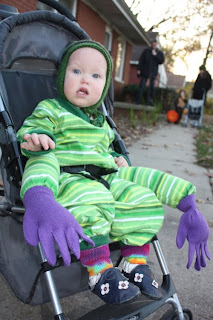
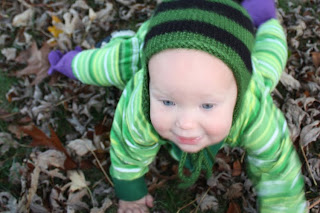

We stayed home after that.
For those of you who missed her, she was a pretty cute bug. See evidence below.




Subscribe to:
Posts (Atom)
